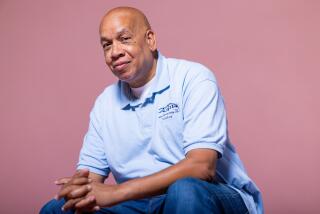‘We Agree to Stop Killing Each Other’ : Gang Peace Treaties Being Negotiated
So far, the document titled “Our Peace Treaty” carries only about a dozen signatures, even though its terms seem beneficial to all parties concerned.
It begins:
1. We the members of the Bloods and the Crips agree to get along with one another, respecting and understanding that we all share a common cultural background.
2. We agree to stop killing each other . . . .
With those words, progress is being reported in the peace process on the streets of Los Angeles County, where the gangs number 400 and the combined membership 50,000.
“This is a beginning,” said Leon Watkins, a regional director of Community Youth Gang Services. “This is where it has to start. . . . We’ll just keep on hoping and praying that it catches on.”
The treaty, conceived by a handful of young black men involved in a street maintenance minimum-wage work program through the Los Angeles city Department of Public Works, is one of several being negotiated through the Community Youth Gang Services in an attempt to declare “a season of peace” from Thanksgiving through Christmas.
Between 80 and 100 gangs are involved in the Community Youth Gang Services peace talks. The goals range from attempts at full non-aggression treaties and temporary truces to simple agreements in which “they at least agree not to step across each other’s territory and become targets,” said Steve Valdivia, the agency’s executive director.
“What we’ll land with I don’t know,” he said.
The peace efforts are escalating this week.
On Thursday, Community Youth Gang Services is planning to announce details and begin recruitment for a jobs program to be called The Genesis Project.
On Friday, radio station KDAY is planning to air a phone-in forum from 2 to 5 p.m., similar to an Oct. 10 forum on the AM station in which the popular rap group Run-D.M.C., singer Barry White and Olympic boxer Paul Gonzales urged peace among gangs.
This time, according to KDAY general manager Ed Kerby, White will be joined in the studio by singer Jermaine Jackson, retired Laker basketball star Jamaal Wilkes, the Whispers singing group and the L.A. Dream Team rap group.
Watkins said the Oct. 10 broadcast helped inspire the young black men in the public works program to develop their own treaty. The youths, who represent gangs aligned with the rival Bloods and Crips amalgamations, said they became friends working together.
Although they now identify themselves as “ex-gang members,” some of the signers still prefer to be known by their street nicknames, such as Maniac and Capone. And though they renounce the gangs, they still put down their names in the gang colors: red for Bloods, blue for Crips.
One group of four--Do-Man, Demon, Maniac and K. Tee Capone, all of whom identified themselves as reformed Crips--sat outside Watkins’ office in the Brotherhood Crusade building in South-Central Los Angeles and talked about how they developed their treaty three weeks ago
“We were working together, Bloods and Crips, and we all got along, like no problem,” explained Do-Man, 18. “There were four or five Bloods on the same crew, and we talked together and got along together. . . . We figured this was the time to stand up and tell the young brothers to wake up to the fact that we all got to live together.”
“I’m tired of seeing my friends and brothers getting killed over stuff that don’t make no kind of sense,” Maniac, 21, said. “I’m tired of it.”
As of Oct. 1, Los Angeles police had recorded 134 gang-related deaths in the city this year, compared to 111 for all of 1985. The increase has been linked, in part, to the violence that seems to go hand-in-hand with lucrative drug-dealing, police said.
Gang-related deaths are down in county jurisdictions, Valdivia said, although updated statistics were not available Tuesday.
Some authorities are skeptical of the purported peace treaties.
“I’ve never seen any indication these treaties do anything in particular to cut down on the killing,” said Lt. Bob Ruchhoft of the Los Angeles Police Department’s gang activities section. “These people are criminal by nature, so how can we expect them to adhere to a treaty anyway?
“But I suppose if it prevents one death, it’s hard to be critical.”
Apprised of the police comments, Do-Man and the others insisted that their sentiments are sincere.
“That’s what they got built up in their minds, you see,” Do-Man said. “They want us to kill each other. They got it built up in their minds that Crips should kill Bloods and Bloods should kill Crips.
“They don’t know nothin’ about the streets. They just drive through them. They didn’t grow up in the streets.”
Watkins said he thinks of the humble treaty as “monumental.”
But he and other intervention workers recognize it could be a fragile monument.
In recent months, Valdivia said, it appeared that progress was being made with warring Latino gangs in Highland Park. But violence has flared up again in the last 2 1/2 weeks, claiming two more lives.
More to Read
Sign up for Essential California
The most important California stories and recommendations in your inbox every morning.
You may occasionally receive promotional content from the Los Angeles Times.










